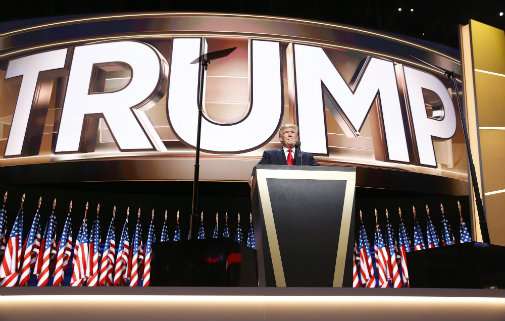Donald Trump's RNC Speech Was a Terrifying Display of Nightmarish Authoritarianism
The GOP presidential nominee had only one solution to every problem: Give him more power.

Donald Trump's speech accepting the Republican nomination was easily the most overt display of authoritarian fear-mongering I can remember seeing in American politics. The entire speech was dark and dystopian, painting America as a dismal, dangerous place beset by violent outsiders. In response to the nation's problems, Trump had only one solution: Donald Trump, the strongman who would take America back, by force if necessary.
Trump framed the speech by painting America as a nation under siege from urban crime, terrorism, and immigrants. He talked of rising homicide levels in some cities. He warned darkly of terrorist and immigrants, practically conflating them with urban violence, and told stories of Americans killed by those who had entered the country illegally. The simplest and more straightforward way to interpret Trump's speech was as a warning that outsiders are coming to America to kill you and your family.
It was a relentlessly grim and gloomy picture of America, built on thinly disguised racial distrust and paranoia. It was a portrait that was also essentially false. Violent crime has been steadily falling for more than two decades. Immigrants are less prone to criminality than native-born Americans.
But portraying America in such a dark light let Trump cast himself as the nation's dark hero, a kind of billionaire-businessman fixer, unbound by rules or expectations of decorum—President Batman, the only one with the guts and the will to fight for the people.
Trump did not invoke superpowers, of course, but he might as well have; he had no other ideas or solutions to offer.
In addition to terrorism and criminality, Trump stoked anxiety about jobs and the economy, lamenting bad trade deals and the loss of manufacturing jobs. As president, he said, he would take our bad trade deals—especially NAFTA—and turn them into good ones. He did not say one word about how, or even what a "good" trade would look like, only that he would fix the problem. Trump promised to bring outsourced jobs back to America, and, as he has in the past, threatened unspecified "consequences" to companies that move operations overseas.
Trump's entire speech was packed with threats and power grabs, details be damned. It was a speech about how government should be made bigger and stronger and given more authority over every part of American life, and government, in most cases, simply meant Donald Trump himself. It was an argument for unlimited government under a single man, for rule by Trump's whim. He sounded less like he was running for president and more like he was campaigning to be an American despot.
Even when Trump veered into policy territory where there might be some overlap with those who favor free markets and limited government, he came across as shallow and unreliable.
He mentioned that his tax plan offered the largest tax cut of any candidate, for example, but said nothing about the mountain of new debt that plan would create. His plan to reduce burdensome regulations was not a plan at all, but two sentences of hollow assertion: "When we are going to deal with the issue of regulation, one of the greatest job-killers of them all. Excessive regulation is costing our country as much as $2 trillion a year, and we will end it very, very soon." That's it. That's his plan. The whole thing. We will end it very, very soon—which, in this context, means I will end it very soon. Trump himself is the only solution that Trump knows.
The hour and fifteen minute long speech was a tour de force of grandiose narcissism, a petulant demand to be placed in the most powerful office in the most powerful nation in the world. Thanks to the Republican party, which nominated him and gave him his platform last night, he is alarmingly close to achieving this goal. Trump is the threat, but the Republican party as an institution deserves nearly as much scorn as Trump for making this happen. The GOP has proved a willing vessel for his ambitions, a ready audience for his dark and troubling argument.
The essence of that argument is that America is unsafe and decline, and that as a result it should be cut off from the world, plunged into fear, and managed by a simple-minded strongman who ego and bluster know no limits. This was the argument that Trump made last night. It is his pitch for the presidency. And it is a lie—a fictitious, nightmarish vision that a power-hungry narcissist invented for the purpose of acquiring power for himself by being elected president. That's the all-too-possible nightmare that should terrify us most.


Show Comments (129)